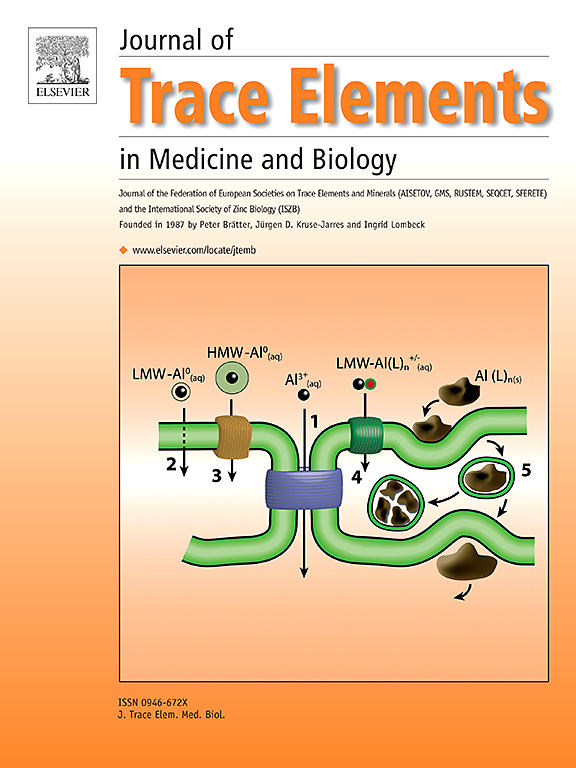Effect of selenium supplementation on inflammatory markers and joint symptoms in patients with rheumatoid arthritis: A meta-analysis and systematic review
IF 3.6
3区 医学
Q2 BIOCHEMISTRY & MOLECULAR BIOLOGY
Journal of Trace Elements in Medicine and Biology
Pub Date : 2025-07-09
DOI:10.1016/j.jtemb.2025.127695
引用次数: 0
Abstract
Objective
The objective of this study was to further evaluate the efficacy of selenium supplementation in patients with rheumatoid arthritis, aiming to provide more reliable evidence-based support for nutritional supplementation in these patients.
Methods
Four databases, the Cochrane Library, Web of Science, PubMed and Embase, were searched for only randomized controlled trials on selenium supplementation in patients with rheumatoid arthritis. The search date ranged from the build date to February 12, 2025. The literature was screened by two researchers according to the appropriate criteria. The assessment of the quality of the studies was conducted using Risk of Bias 2.0. The data were analyzed in this study using RevMan 5.4.
Results
Seven studies including a total of 367 patients with rheumatoid arthritis were included in the study. The results showed that selenium supplementation was effective in reducing the VAS score (MD = -12.68, 95 % CI [-19.08, − 6.28], P = 0.0001) and the Ritchie index (MD = -1.13, 95 % CI [-2.22, − 0.05], P = 0.04) in patients with RA. However, selenium supplementation in patients with rheumatoid arthritis reduced the erythrocyte sedimentation rate (MD = − 8.87, 95 % CI [-3.60, 1.85], P = 0.53), and the C-reactive protein levels (MD = − 0.67, 95 % CI [-1.43, 0.1], P = 0.09), relieved morning stiffness (MD = 0.00, 95 % CI [-0.13, 0.13], P = 0.95), and joint swelling (MD = − 0.06, 95 % CI [-0.54, 0.42], P = 0.81) but these effects were not statistically significant.
Conclusions
Meta-analysis revealed that selenium supplementation has beneficial effects on joint pain in patients with rheumatoid arthritis. However, further clinical trials are needed to elucidate its effects on the erythrocyte sedimentation rate, C-reactive protein levels, morning stiffness, and joint swelling in rheumatoid arthritis patients.
补充硒对类风湿关节炎患者炎症标志物和关节症状的影响:荟萃分析和系统评价
目的进一步评价补充硒对类风湿关节炎患者的疗效,为类风湿关节炎患者补充硒提供更可靠的循证支持。方法检索Cochrane图书馆、Web of Science、PubMed和Embase四个数据库,仅检索类风湿关节炎患者补充硒的随机对照试验。搜索日期从建造日期到2025年2月12日。文献由两位研究者根据适当的标准进行筛选。使用风险偏倚2.0对研究质量进行评估。本研究采用RevMan 5.4软件对数据进行分析。结果7项研究共纳入367例类风湿关节炎患者。结果显示,补充硒可有效降低RA患者的VAS评分(MD = -12.68, 95 % CI [-19.08, - 6.28], P = 0.0001)和Ritchie指数(MD = -1.13, 95 % CI [-2.22, - 0.05], P = 0.04)。然而,硒补充剂类风湿性关节炎患者减少了红细胞沉降率(MD =−8.87,95 % CI [-3.60, 1.85], P = 0.53),和c反应蛋白水平(MD =−0.67,95 % CI [-1.43, 0.1], P = 0.09),缓解早上刚度(MD = 0.00, 95 % CI [-0.13, 0.13], P = 0.95),和关节肿胀(MD =−0.06,95 % CI [-0.54, 0.42], P = 0.81)但这些效果未达到统计上的显著水平。结论meta分析显示,补充硒对类风湿关节炎患者关节疼痛有有益作用。然而,需要进一步的临床试验来阐明其对类风湿关节炎患者的红细胞沉降率、c反应蛋白水平、晨僵和关节肿胀的影响。
本文章由计算机程序翻译,如有差异,请以英文原文为准。
求助全文
约1分钟内获得全文
求助全文
来源期刊
CiteScore
6.60
自引率
2.90%
发文量
202
审稿时长
85 days
期刊介绍:
The journal provides the reader with a thorough description of theoretical and applied aspects of trace elements in medicine and biology and is devoted to the advancement of scientific knowledge about trace elements and trace element species. Trace elements play essential roles in the maintenance of physiological processes. During the last decades there has been a great deal of scientific investigation about the function and binding of trace elements. The Journal of Trace Elements in Medicine and Biology focuses on the description and dissemination of scientific results concerning the role of trace elements with respect to their mode of action in health and disease and nutritional importance. Progress in the knowledge of the biological role of trace elements depends, however, on advances in trace elements chemistry. Thus the Journal of Trace Elements in Medicine and Biology will include only those papers that base their results on proven analytical methods.
Also, we only publish those articles in which the quality assurance regarding the execution of experiments and achievement of results is guaranteed.

 求助内容:
求助内容: 应助结果提醒方式:
应助结果提醒方式:


